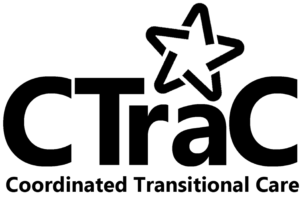- Dissemination and Implementation
- Engagement in Care
- HIPxChange
- Older Adults
- Quality and Safety
- Transitions in Care
*Free registration is required to use the toolkits provided within HIPxChange. This information is required by our funders and is used to determine the impact of the materials posted on the website.
About the C-TraC Program
The Coordinated-Transitional Care (C-TraC) program is a low-resource, registered nurse telephone-based initiative that was developed and tested in the William S. Middleton Memorial Veterans Hospital in response to the Affordable Care Act’s call to disseminate effective and cost-efficient transitional care programs that improve patient safety and post-discharge outcomes. C-TraC aims to address the added difficulties of caring for a widely dispersed patient population with high rates of dementia and other high-risk conditions.
It was developed by researchers and clinicians at the University of Wisconsin-Madison School of Medicine & Public Health and the Geriatrics Research, Education and Clinical Center (GRECC) at the William S. Middleton Memorial VA Hospital (Principal Investigator: Amy J.H. Kind, MD PhD).
Highlights of the C-TraC Program Toolkit
- An overview of barriers to providing high quality transitional care.
- Core components of the C-TraC Program protocol.
- A step-by-step guide to executing the C-TraC Program protocol.
- An overview of common challenges to the C-TraC Program.
COMPASS as a Module of C-TraC
COMPASS is a low-resource, protocol-driven, registered nurse initiative that was developed as a module of the VA Coordinated-Transitional Care (C-TraC) Program. While C-TraC provides transitional care services to patients discharged from hospital to home, it was not developed to support hospital to nursing home transitions. COMPASS fills this gap, supporting patients discharged to nursing homes by incorporating patient and caregiver education empowerment that C-TraC utilizes, while ensuring high quality, bi-directional system-to-system communication between the hospital and nursing home. Existing C-TraC programs can incorporate COMPASS protocols into their operations with transitions of care staff already in place.
Who should use this toolkit?
This toolkit is designed to help both clinicians and researchers execute the C-TraC Program protocol. This toolkit is intended for clinicians (nurses, pharmacists, physicians), quality and safety professionals, and researchers.
Funding
This project was supported by a VA Transformation-21 Grant, a Veterans Health Administration Office of the Assistant Deputy Under Secretary for Health (ADUSH) for Policy and Planning Grant, and by a National Institute on Aging Beeson Career Development Award (K23AG034551, National Institute on Aging, The American Federation for Aging Research, The John A. Hartford Foundation, The Atlantic Philanthropies and The Starr Foundation). Additional support was provided by the University of Wisconsin School of Medicine and Public Health’s Health Innovation Program, and the Community-Academic Partnerships core of the University of Wisconsin Institute for Clinical and Translational Research (UW ICTR), grant 1UL1RR025011 from the Clinical and Translational Science Award (CTSA) program of the National Center for Research Resources, National Institutes of Health.
References
- Kind AJ, Jensen L, Barczi S, Bridges A, Kordahl R, Smith MA, Asthana S. Low-cost transitional care with nurse managers making mostly phone contact with patients cut rehospitalization at a VA hospital. Health Aff (Millwood). 2012 Dec;31(12):2659-68.
- Gilmore-Bykovskyi A, Jensen L, Kind AJ. Development and Implementation of the Coordinated-Transitional Care (C-TraC) Program. Fed Pract. 2014 Feb 1;31(2):30-34.
- Kind AJ, Brenny-Fitzpatrick M, Leahy-Gross K, Mirr J, Chapman E, Frey B, Houlahan B. Harnessing Protocolized Adaptation in Dissemination: Successful Implementation and Sustainment of the Veterans Affairs Coordinated-Transitional Care Program in a Non-Veterans Affairs Hospital. J Am Geriatr Soc. 2016 Feb;64(2):409-16.
Toolkit Citation
Kind AJH. The Department of Veterans Affairs Coordinated-Transitional Care (C-TraC) Program Toolkit. Madison, WI: Madison VA Geriatric Research and Clinical Centers (GRECC) and the UW Health Innovation Program; 2012. Available from: http://www.hipxchange.org/C-TraC.
C-TraC Toolkit Profile on AHRQ Innovations Exchange
The VA C-TraC program is profiled in the Agency for Healthcare Research and Quality’s Health Care Innovations Exchange, a web-based program designed to support health care professionals in sharing and adopting innovations that improve health care quality. View the C-TraC profile by clicking the button below.





